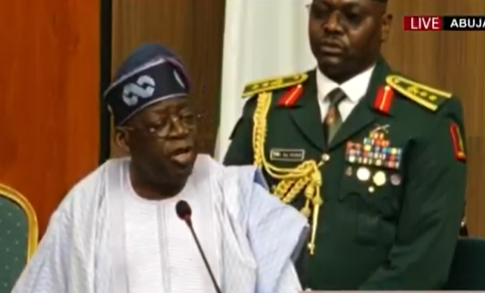News
Tinubu Honours June 12 Heroes, Grants Posthumous Pardon to Ogoni Nine

President Bola Ahmed Tinubu has honoured over 80 Nigerians with national awards as part of his Democracy Day address to a joint session of the National Assembly, using the moment to commemorate the country’s pro-democracy heroes and chart a path of national healing.
During his speech, Tinubu reflected on Nigeria’s democratic journey, recalling the sacrifices made by individuals who challenged military rule and paid dearly for their convictions. He described June 12 not just as a date, but as a symbol of resistance, resilience, and the ultimate price paid for the nation’s democratic freedoms.
Among the recognitions, the late Alhaja Kudirat Abiola was posthumously awarded the Commander of the Federal Republic (CFR). Her role in standing up to military oppression, which cost her life, was praised by the president as emblematic of unwavering commitment to justice. Major General Shehu Musa Yar’Adua also received posthumous recognition with the nation’s highest honour, the Grand Commander of the Federal Republic (GCFR), a tribute to his role in organising political opposition during one of the darkest chapters of Nigeria’s history.
President Tinubu’s message extended beyond remembrance. He used the occasion to announce a full presidential pardon for Ken Saro-Wiwa and the Ogoni Nine—men executed in 1995 for their activism against environmental degradation in the Niger Delta. According to the president, this decision was not just a correction of historical wrongs but a step toward genuine reconciliation. He promised to consult the National Council of State before releasing the full list of those pardoned.
The names celebrated cut across decades of activism, intellectual resistance, journalism, and political advocacy. Tinubu paid glowing tribute to living figures who, he said, embody the democratic spirit in present-day Nigeria. Their voices, ideas, and courage, he remarked, continue to influence national discourse.
As part of the commemorations, prominent journalists, civil society advocates, legal activists, and academic thinkers were also decorated for their contributions to democracy and human rights. Tinubu noted that their recognition was long overdue and necessary to remind younger generations of the roles these individuals played in shaping Nigeria’s democratic identity.
The president’s remarks were punctuated by moments of applause from lawmakers and dignitaries, particularly when he spoke about the importance of national unity and the need to preserve hard-won freedoms. He urged Nigerians to carry forward the legacy of June 12 by remaining committed to democratic principles and by upholding the rule of law, equity, and accountability.
By turning this year’s Democracy Day into a platform for national reflection and celebration, Tinubu sought to bridge the gap between past struggles and present aspirations. His message made clear that democracy in Nigeria is not the gift of a single generation, but a collective inheritance earned through sacrifice, courage, and an unyielding belief in the possibility of a better nation.
RECOMMENDED FOR YOU
Tinubu Said He Never Blocked Party Registrations—Here’s What Else He Added





























